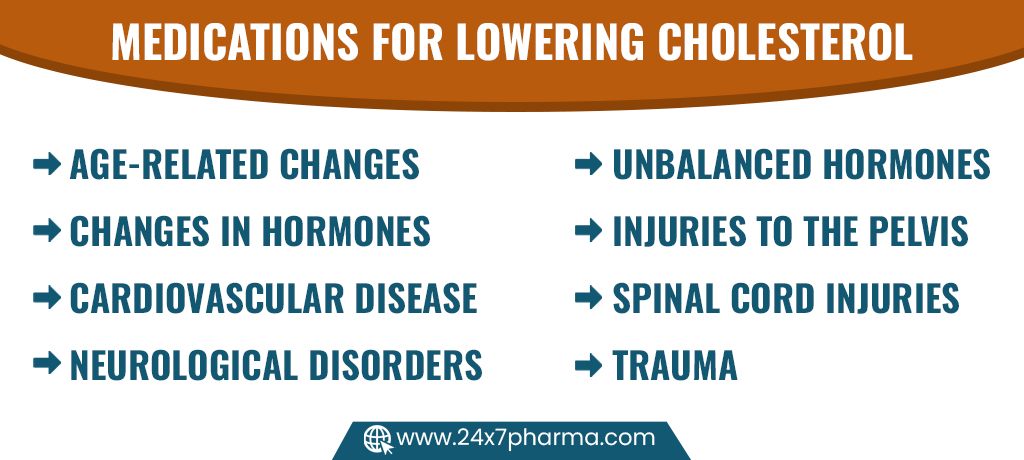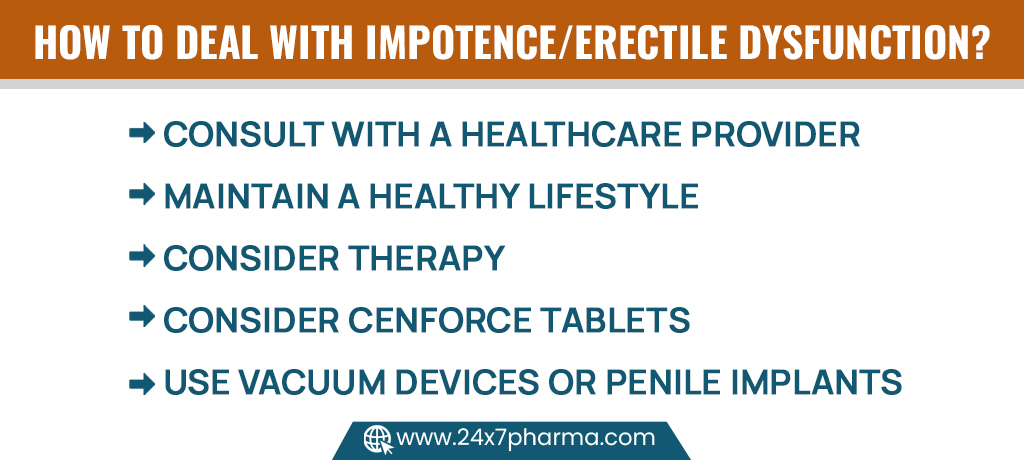Do you have impotence or erectile dysfunction? It’s a common problem that can leave you frustrated and alone, but it’s critical to understand that you’re not alone.
In fact, millions of men have impotence at some point in their lives, and several possible causes could be limiting your sexual life.
Let’s explore seven of the most common impotence causes and what you can do to address them and get back to a satisfying and fulfilling sex life.
But before exploring, you need to know the following:
What is Impotence?
Impotence, also known as erectile dysfunction (ED), is a condition in which a man’s ability to achieve or maintain an erection during sexual activity is impaired. It’s a frustrating and embarrassing problem that can make men feel as if they can’t perform or satisfy their partner.
Impotence is often caused by physical factors such as diabetes, heart disease, or nerve damage, but it can also be caused by psychological issues such as stress, anxiety, or depression.
Regardless of the cause, impotence can significantly impact a man’s self-esteem and confidence. While trying to ignore or conceal the problem may be tempting, it is critical to seek treatment if you are experiencing impotence.
Treatment options include everything from lifestyle changes to medications to therapy. It is critical to remember that impotence is a common problem and that there is no shame in seeking help.
How Does a Male Get to Know He Is Impotent?
For a man, realizing he is impotent can be a difficult and sometimes embarrassing experience. Several situations can lead a man to believe he is impotent; we will look at some of them in this article.
-
Difficulty Getting or Keeping an Erection
- The inability to achieve or maintain an erection during sexual activity is the most common sign of impotence. If you are having trouble achieving or maintaining an erection, this could signify that you are impotent.
-
Sexual Desire Has Decreased
- If you notice a decrease in sexual desire or interest in sex, this could signify impotence. Physical and psychological factors can both contribute to this.
-
Performance Stress
- If you have performance anxiety during sexual activity, it may be difficult to achieve or maintain an erection. This can be a vicious cycle, as anxiety can lead to increased impotence, which leads to even more anxiety.
7 Primary Impotence Causes You to Need to Know
If you have impotence, you may feel isolated and frustrated. But the truth is that many men experience this problem at some point in their lives, and there are several potential causes. To help you better understand and treat your impotence, we’ll look at the 7 most common causes of impotence.
You can take proactive steps towards regaining your sexual confidence and enjoying a satisfying and fulfilling sex life by gaining a deeper understanding of the underlying factors that may be at work.
Physical Health Conditions Impotence, also known as erectile dysfunction, is a tensing condition that can harm a man’s sexual life. Physical health conditions are one of the Impotence Causes, though they can be caused by various factors.
-
Cardiovascular Disease
- Cardiovascular disease is one of the most common Impotence causes. It can cause blood vessels to narrow and blood flow to decrease, making it difficult to achieve or maintain an erection.
-
Diabetes
- It can cause damage to blood vessels and nerves, which can lead to impotence. In fact, men with diabetes have a higher risk of developing impotence than those who do not have the disease.
-
Obesity
- Obesity is a risk factor for various health problems, including impotence. It can affect blood flow and hormone levels, leading to impotence.
-
Neurological Disorders
- Impotence can also be caused by neurological conditions such as multiple sclerosis or Parkinson’s. These conditions can have an effect on nerve signals as well as blood flow to the penis.
-
Psychological Factors
- Erectile dysfunction can be a painful condition that significantly impacts a man’s sexual life. Although physical health conditions are frequently blamed for their development, psychological factors can also play a role.
-
Anxiety and Stress
- Stress and anxiety can affect hormone levels, blood flow, and nerve signals necessary for achieving and maintaining an erection. This can result in impotence, especially if the stress or anxiety persists.
-
Depression
- Depression can affect a person’s overall mood and outlook on life and sexual function. In fact, studies have found that men who suffer from depression are more likely to develop impotence. It is a getting one of the normal impotence causes.
-
Relationship Problems
- Impotence can also be caused by relationship issues such as poor communication or a lack of emotional connection. These issues can have an effect on a person’s overall mental and emotional state, which can then have an effect on their sexual function.
-
Lifestyle Choices
- Lifestyle preferences, in addition to physical and psychological factors, can contribute to the development of impotence. The following are some of the most common lifestyle choices that can contribute to impotence causes.
-
Smoking/Cigarette
- Smoking can cause blood vessel damage and reduce blood flow to the penis, resulting in impotence.
-
Drugs and Alcoholism
- Excessive alcohol and drug use can cause impotence by interfering with nerve signals and decreasing blood flow.
-
Sedentary Way of Life
- Sedentism and a lack of physical activity can contribute to impotence by decreasing blood flow and testosterone levels.
-
Poor Diet
- Obesity, diabetes, and other conditions that contribute to impotence can be caused by a poor diet high in saturated fats, sugar, and processed foods.
-
Stress
- Stressful situations at work or home can disrupt hormone levels and impair blood flow, resulting in impotence.
-
Medications
- While medications can treat many conditions, they can also have side effects, one of which is impotence. The most common medications that can contribute to Impotence Causes are listed below.
-
Antidepressants
- Certain antidepressants can affect hormone levels, reduce libido, and interfere with blood flow to the penis, resulting in impotence.
-
Blood Pressure Treatments
- Certain blood pressure medications, such as beta-blockers and diuretics, can also cause impotence by reducing blood flow to the penis.
-
Antihistamines
- These are commonly used to treat allergies but can also disrupt nerve signals and cause impotence.
Medications for Lowering Cholesterol

-
Age-Related Changes
- Men’s sexual function frequently changes as they get older. Age-related changes can cause impotence, but it is not always unavoidable. Here are some of the possible causes of erectile dysfunction in older men.
-
Changes in Hormones
- Men’s testosterone levels naturally decline as they age, which can lead to impotence. This decline can also lead to a drop in libido and mood swings.
-
Cardiovascular Disease
- Impotence can be caused by age-related changes in the cardiovascular system. For example, atherosclerosis, or the narrowing of blood vessels, can limit blood flow to the penis, making it difficult to achieve or maintain an erection.
-
Neurological Disorders
- Age-related changes in the nervous system can also cause impotence. Nerve damage caused by conditions such as Parkinson’s disease and multiple sclerosis can make it difficult to achieve an erection.
-
Unbalanced Hormones
- Impotence, also known as erectile dysfunction, can be caused by hormonal imbalances. Hormones play an important role in the male reproductive system, and changes in their levels can impact sexual function. Some of the hormonal imbalances that can cause impotence are as follows:
- Low Testosterone: Testosterone is the primary male sex hormone, regulating sex drive, sperm production, and penis and testicle growth. Impotence can be caused by low testosterone levels.
- High Levels of Prolactin: Prolactin is a hormone that stimulates milk production in women. Men, on the other hand, produce prolactin, and high levels can cause erectile dysfunction.
- Thyroid Disorders: Hormones produced by the thyroid gland regulate metabolism. An overactive or underactive thyroid can cause sex hormone imbalances and impotence.
- Disorders of The Adrenal Glands: The adrenal glands produce hormones that regulate stress responses and sex hormones. Disorders like Cushing’s syndrome and Addison’s disease can disrupt hormone levels and cause impotence.
- Injuries: Injury to the pelvic region or the spinal cord can result in impotence due to nerve damage or restricted blood flow. The severity of the problem will depend on the severity of the injury, but men are not uncommon to experience impotence after certain types of injuries.
- Impotence, also known as erectile dysfunction, can be caused by hormonal imbalances. Hormones play an important role in the male reproductive system, and changes in their levels can impact sexual function. Some of the hormonal imbalances that can cause impotence are as follows:
-
Injuries to The Pelvis
- Injuries to the pelvic area can harm the nerves and blood vessels that control blood flow to the penis. This can occur due to perineum fractures, dislocations, or trauma, resulting in impotence.
-
Spinal Cord Injuries
- Injuries to the spinal cord can disrupt the nerve impulses that control blood flow to the penis, resulting in impotence.
- The effect on sexual function is determined by the location of the injury along the spinal cord. The greater the severity of the injury, the greater the impact on sexual function.
-
Trauma
- Any trauma to the penis can damage the nerves and blood vessels responsible for an erection, leading to impotence. This can happen due to an accident or another type of trauma.
How to Deal with Impotence/Erectile Dysfunction?

-
Consult with A Healthcare Provider
- If you are experiencing ED symptoms, you must seek medical attention. A doctor can perform a physical exam and recommend appropriate treatment options, such as Cenforce 100 mg, which contains Sildenafil Citrate, an FDA-approved ED medication.
-
Maintain A Healthy Lifestyle
- A healthy lifestyle can improve overall health, including sexual function. Quitting smoking, limiting alcohol consumption, eating a healthy diet, and regularly exercising can all help to prevent or alleviate ED.
-
Consider Therapy
- Psychological factors such as stress, anxiety, or depression can also contribute to ED. For example, cognitive-behavioral therapy or counseling can help address these issues and improve sexual function.
-
Consider Cenforce Tablets
- Cenforce tablets containing Sildenafil Citrate are an effective and cost-effective treatment option for ED. These pills increase blood flow to the penis, resulting in a firmer and longer-lasting erection.
-
Use Vacuum Devices or Penile Implants
- For some men, using vacuum devices or penile implants to achieve an erection may be necessary. A vacuum device draws blood into the penis by creating a vacuum, whereas a penile implant involves surgically implanting a device inside the penis to create an erection.
Preventive Measures for Impotence
Preventive measures can assist in lowering the risk of impotence caused by various factors.
-
- Maintaining a healthy lifestyle through a well-balanced diet, regular exercise, and avoiding excessive alcohol and tobacco consumption can help prevent health conditions that can lead to impotence.
- It is critical to managing chronic health conditions that can impair sexual function, such as diabetes and high blood pressure.
- Stress reduction techniques such as meditation or yoga can also be beneficial.
- Taking medications as directed and consulting a doctor before discontinuing or changing medications can reduce the risk of impotence caused by certain medications.
- Regular check-ups with a healthcare provider can also aid in the early detection of health issues that may contribute to impotence.
- These preventive measures can help reduce the risk of impotence while promoting overall sexual health.
Conclusion
Don’t let impotence take over your sexual life. Be aware of the most common Impotence Causes and take the necessary precautions to maintain your sexual health.
If you are experiencing impotence, speak with your doctor about treatment options such as Cenforce 200 mg tablets. Prioritize your sexual health and keep the fire burning in your belly.

